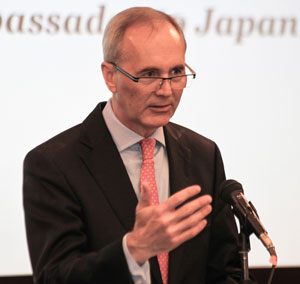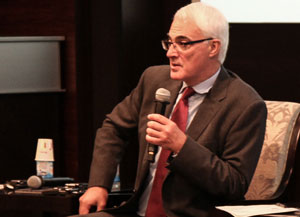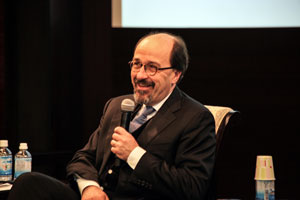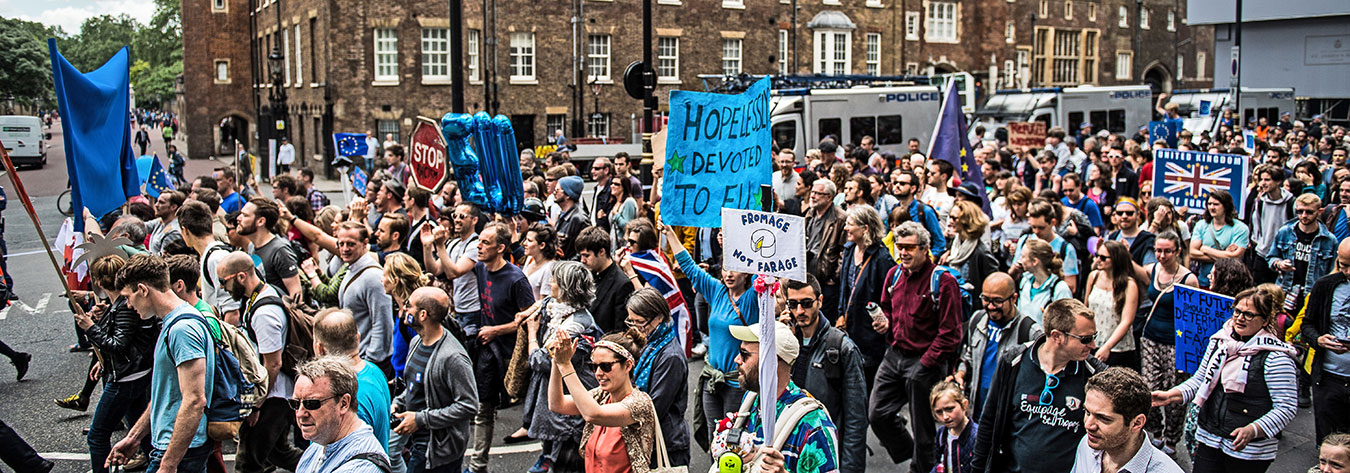A number of seismic economic and political shifts shook the global financial and political landscape last year, including the UK’s Brexit decision and the election of Donald Trump as president of the US.
It was against this uncertain backdrop that the Daiwa Institute of Research and the Royal Institute of International Affairs (Chatham House) convened a seminar titled, “Economic Uncertainty, Risk and the Limits of National Governance: Perspectives from Japan and the UK”.
Held at the Daiwa Conference Hall in Tokyo’s Marunouchi district on 7 December, the joint seminar included a video address by Japanese Prime Minister Shinzo Abe and panels of leading political and financial experts.

Tim Hitchens CMG LVO
“Brexit does not mean a retreat from the world”, said Tim Hitchens CMG LVO, then-UK Ambassador to Japan, as part of the event’s opening remarks. He noted that, although there have been some “ups and downs in the UK–Japan relationship, including the UK’s decision to join the (China-led) Asian Infrastructure Investment Bank … the fundamentals of the UK–Japan relationship remain unchanged and strong”.
Indeed, the UK’s involvement in the delicate geopolitical balance in East Asia was an important point at the seminar.
“A UK that appears inclined to be more accommodating towards China worries Japan’s political leadership and citizens, who are aware of this and its implications”, warned Sahoko Kaji, a professor at Keio University’s Faculty of Economics.
But Hitchens highlighted the key bonds that bind the UK and Japan, including shared values and interest in having a rules–based international system of democracy. He also underlined the transformation of the UK–Japan defence and security relationship, describing Japan as the UK’s “closest security partner in Asia”.
This bond, he said, has been strengthened through collaboration between the Japan Self-Defense Forces and the British Armed Forces, as well as shared foreign policy on issues such as South Sudan and Syria.
Secondly, he stated, “We have an exceptionally strong trade and investment relationship”. Explaining that this is the central pillar of the UK–Japan relationship, with the UK being the top EU destination for Japanese investment, he added that British exports to Japan are worth £10 billion a year, according to the latest available figures.
Hitchens maintained that research and development (R&D) will remain key to the UK–Japan relationship. The UK is Japan’s fourth-largest global partner in R&D collaboration, with more than 8,000 researchers, collectively, in research areas ranging from dementia to cyber security.
Then there is the upcoming Tokyo 2020 Olympic and Paralympic Games, which have taken centre stage in UK–Japan collaboration.
Hitchens emphasised the UK’s intention to maintain transparency with the Japanese government and Japanese businesses to “ensure there are no surprises” regarding the Brexit negotiations.
“Each sector has a different set of concerns”, Hitchens explained. But for Japanese firms, access to labour, research funding, as well as passporting rights and equivalence for the financial services sector are some of the most important. The UK is committed to taking on Japan’s views, he added.
The problem with politics
Political and economic tensions within the UK had a strong hand in the Brexit referendum result, as they shall have in the Brexit negotiations with the EU, too. The decline of the post-war consensus at the end of the 1970s combined with the 2008 financial crisis have divided the UK population on both economic and political levels, and the referendum revealed these inequalities and the polarisation in political views.

Lord Darling said the Brexit negotiations will not be a normal one between two willing parties.
“This referendum was nothing to do with trading relationships”, he said, explaining that the result reflects worldwide trends. A dissatisfied section of society had changed the political and economic environment, in which immigration was a major factor. Comparing the reaction of London residents and those of the capital’s outskirts, he noted that “perceptions are just very different”.
“For the first time we now have a generation who believe their children are going to be poorer than they were”, Darling added. “It is what happens when you find a large population simply feeling they have been left behind”.
This move away from mainstream thinking was in step with recent developments in Europe. In France, support for Marine Le Pen’s far-right National Front continues to increase, and in Germany the Alternative für Deutschland Party, established in 2013, has gained support, particularly in opposition to Chancellor Angela Merkel’s refugee policies. In addition, the recent presidential election in Austria last year saw a close race between Alexander Van der Bellen and far-right candidate Norbert Hofer. And further away, the results of the US presidential election in November, as with Brexit, was an outcome not expected by the establishment.
Regarding Brexit, the UK’s concern, Darling said, is “trying to figure out what our negotiating position is going to be”. In a bid to assure the audience, he said that the government would produce a white paper stating their negotiation policy by the end of March, when Prime Minister Theresa May intends to trigger Article 50, the EU’s exit clause.
“I don’t see this as a normal negotiation that you might have between two willing parties trying to get to a commonly agreed objective”, he said.
Lord Darling explained that, although economics and common sense might lead to one set of proposals being deemed reasonable, ultimately the UK is “hard up against British politics”, which is currently dominated by Brexit thinking and lacks effective opposition.
In any case, Darling anticipates that the process will be long, drawn out and not helped by domestic European politics.
“The one thing you cannot accuse the EU of doing is acting with speed”, he said.
Kaji of Keio University talked about the anti-establishment trends that are occurring worldwide, particularly in the US, UK and EU. She agreed that a solution needed to be found to appease angry voters, and highlighted the issue of social media contributing to a “post-truth” environment.
In relation to Japan, Kaji said that problems could arise if young people are not represented in the political sphere, describing it as an “extremely dangerous phenomenon”.

Bill Emmott, editor-in-chief of The Economist, 1993–2006
When asked how politicians on both sides were blindsided by Brexit, Darling answered: “Then-Prime Minister David Cameron thought that he could heal the wounds within the Conservative Party that has been split by the EU for 30 years now. “He thought he could just get through this referendum”, he added.
He expressed the belief that the Labour Party’s current leader Jeremy Corbyn is not “engaged” in the Brexit negotiations, and the party itself consists more and more of people who have “no interest in [Labour] being in government” of the EU. Moreover, many of their voters are slipping away to the UK Independence Party because of the appeal of populist nationalism.
He concluded that, “referendums are really divisive things” and urged that they should be avoided.
When asked what political approach could be recommended to leaders, Emmott explained that, the political classes were at fault. Specifically, their “failure to deliver stable and rising prosperity and living standards, and the failure to prevent the crisis of 2008” and then further to amend and change things were to blame.
“I think that the new formula has to be one that emphasises equality much more than it has been in the past, but without being a classic socialist equality” based on “redistribution according to need rather than deserving”. He also argued that everyone should have a political voice, rather than a democracy focused on the “best policies that money can buy”. “If you can achieve that then you’ve got it made”.
Concerns
Masatsugu Asakawa, vice finance minister for international affairs, emphasised Japanese investors’ concerns over Brexit. He pointed out that the Japanese government has already clearly communicated its thoughts to its UK counterpart and the EU. In September, the Japanese government issued a letter setting out its position on Brexit.
Kaji echoed this, explaining that the letter, “should be taken extremely seriously”. With more than 1,000 Japanese firms in the UK, Kaji expressed her concern that the UK has not done enough to reassure them of future opportunities in the UK market. “If there is anything the Japanese do not like, it is instability”, she added, saying that, “the more information, the better”.
Emmott noted that EU membership is only one factor affecting the British economy for investors, with trade and fiscal policy, overseas demand and oil prices being other important factors.
According to Emmott, negotiations are likely to lead to a “relationship with Europe that is analogous to [that of] Switzerland”, with a few differences. But, he pointed out, it is difficult to say which model would be most appropriate to follow. Unless there is a change to the freedom of movement rules by the EU, potential models are limited to Switzerland or, perhaps, Canada, which recently signed a free trade agreement with the EU. In any case, there will need to be partnership on trade and global immigration, as well as filling gaps resulting from the “decline in American leadership”.
Asakawa explained that Japan is committed to free trade, as shown by its ratification of the Trans-Pacific Partnership (TPP) agreement. Further, it is important to emphasise the merits of the TPP for the US. These kinds of multilateral agreements “have their merits”, he said.
The TPP in its current form will not go ahead without the support of the US, and Emmott noted that, even prior to the election of Donald Trump, “TPP was in trouble in Congress”. He added that Trump’s priorities will be the domestic economy, and so “the likelihood that Congress would favour TPP in the next one to two years has to be rated as low”.
The panel agreed that the UK and Japan need to work as allies to both prevent Donald Trump from leaning towards protectionism, and support international agreements on trade, investment and tax.
Training and structural adjustment
“Globally, I think there is a need to find ways to redistribute wealth”, Asakawa said, highlighting the Japanese government’s efforts to do so through Abenomics.
Capital movements and the impact of technology and automation have caused uncertainty in job markets, said Emmott. In this respect, retraining the workforce to meet these changes is important, and he noted that Scandinavian countries are leading the way.
Talking about Japan, Kaji said, “We do have a certain record on keeping people in jobs … firing people outright is just not done in this country”. This means that on-the-job training is carried out from time to time, although globalisation has meant this has become increasingly rare.
Future of UK–Japan ties
Asakawa said that Japan wants to collaborate with those who share a “fundamental set of values”. He suggested, “Maybe after Brexit we could establish a bilateral agreement with the UK”, however Japan is focused first on the TPP and then on a trade agreement with the EU.
There is also an opportunity to collaborate further on defence, he noted, echoing Hitchens’ earlier comments. The UK and Japan have already been involved in talks on North Korea, the East China Sea, counter-terrorism and anti-corruption efforts.
Kaji also suggested that the combination of the UK’s so-called special relationship with the US and its membership of the EU had previously left the UK “unreachable”. As this has changed, Japan and the UK now share a similar global position, meaning there is potential for a closer UK–Japan relationship.
“There is big potential in technology and R&D collaboration”, Emmott concluded. And, in addition, “it is absolutely crucial that the UK and Japan collaborate to domesticate Donald Trump”, in preparation for the next eight years.







